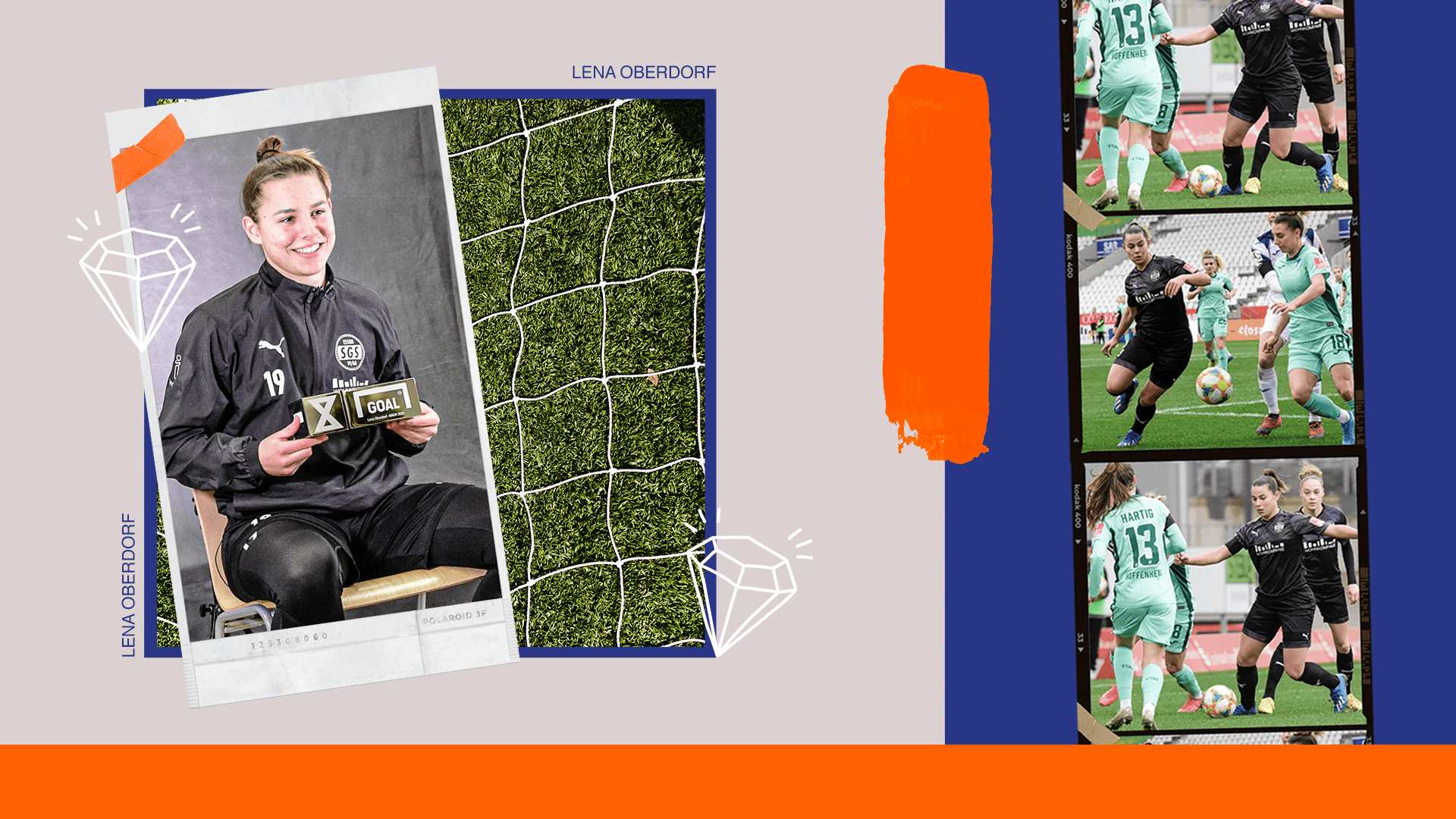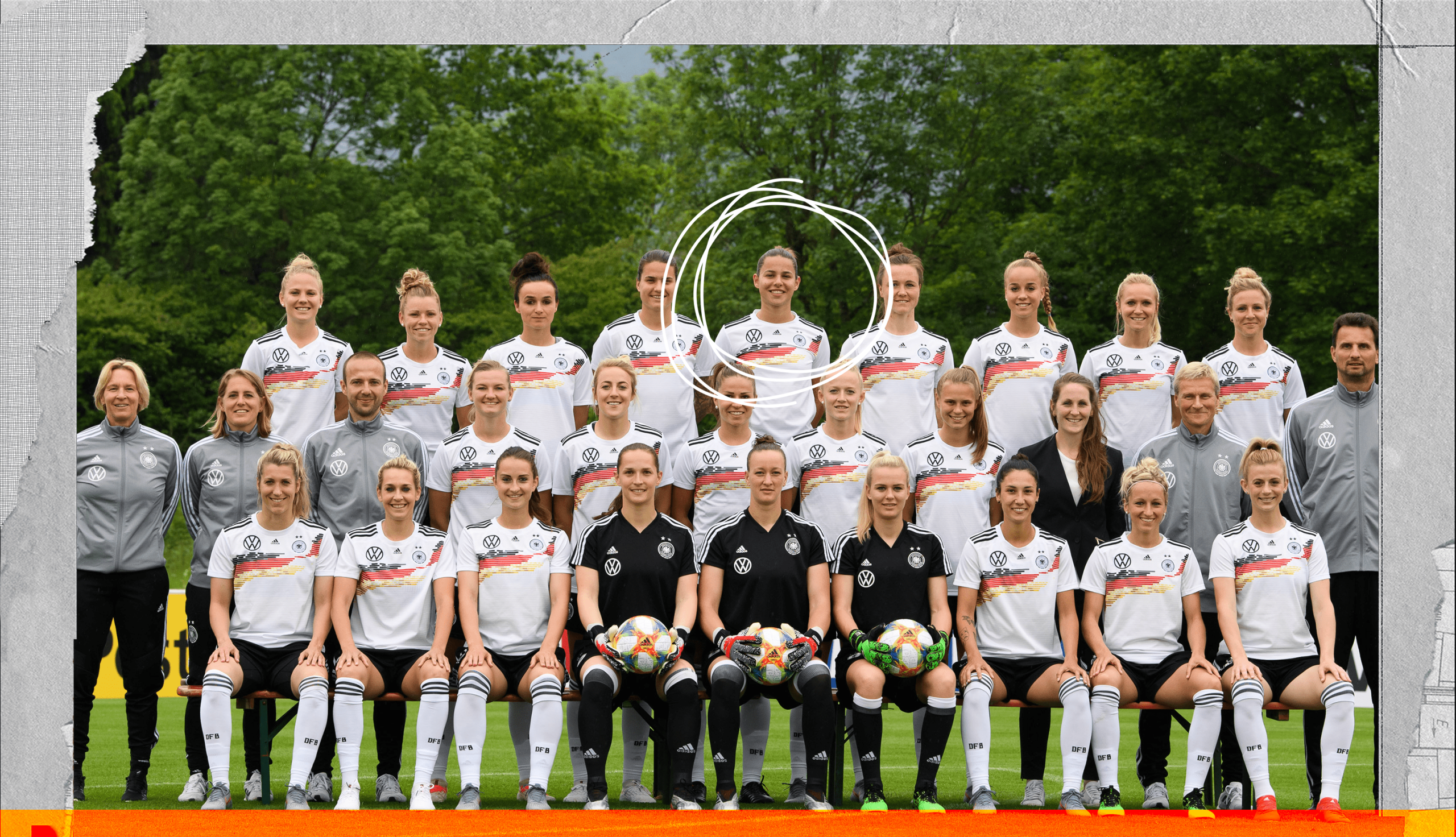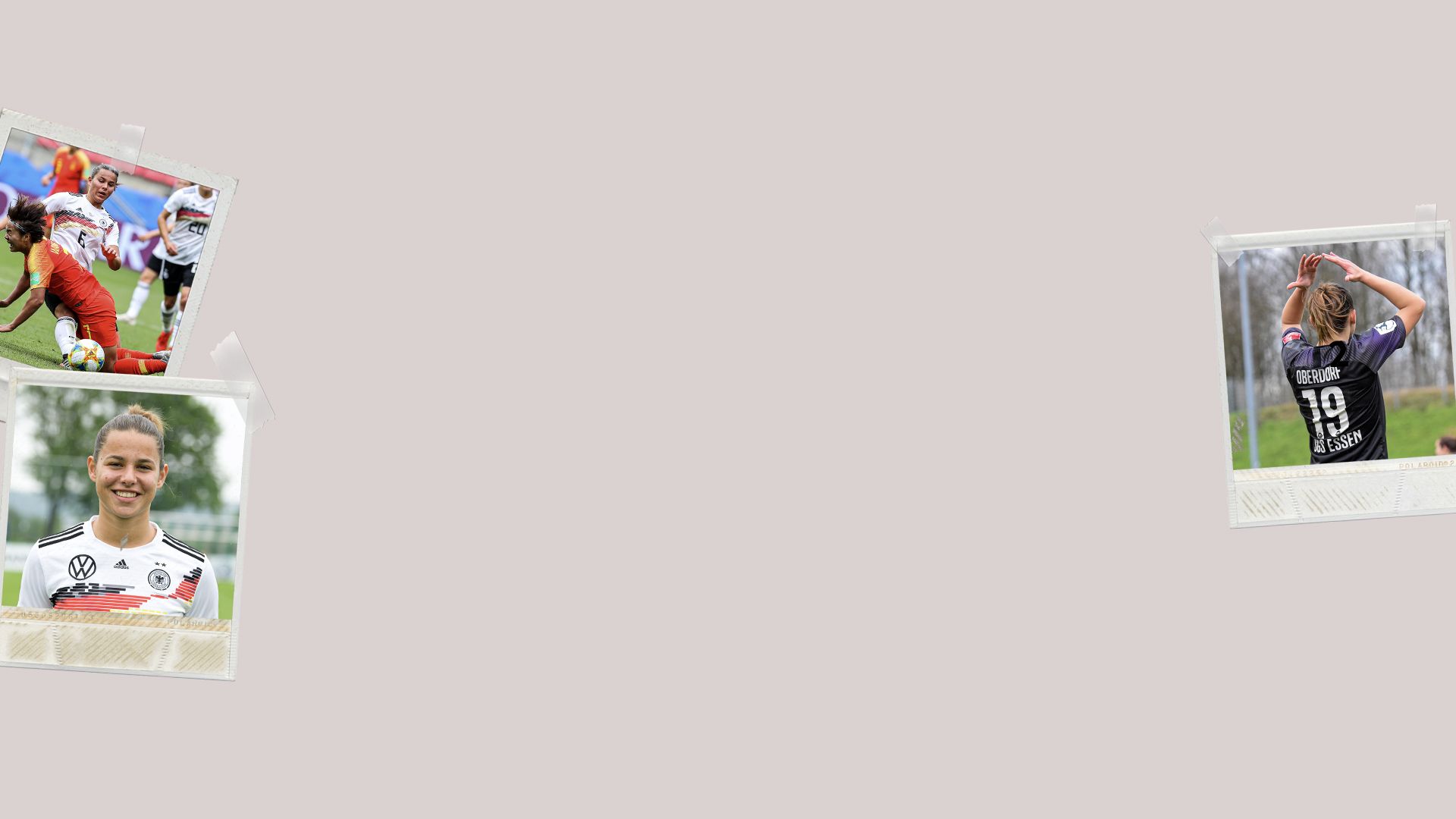

Lena Oberdorf:
The jewel at the heart of German football
By Ameé Ruszkai
Ask Lena Oberdorf what her top three career highlights are to date, and she’ll reel off achievements that most players don’t have by the time they hang up their boots.
Going to a Women’s World Cup is first, beating England at Wembley in front of almost 78,000 fans is second, while winning the UEFA Under-17 Championship with Germany rounds off the trio for a player who is still just 18 years old.
Not many players start their careers with such success, particularly at the highest level.
But Lena Oberdorf, Goal’s inaugural women’s NxGn winner, isn’t like most players.
When the versatile player signed for SGS Essen in the summer of 2018, Oberdorf’s only experience of playing in the women’s game was with Germany’s youth teams.
Until then, she had played with the boys at TSG Sprockhovel, a club on the fifth tier of the German football pyramid.
It’s a journey that is particularly uncommon in the women’s game, but one that has fast-tracked her development, as a player and a person.
It’s ensured she has made an impact at senior level almost immediately.






Lena Oberdorf:
The jewel at the heart of German football
By Ameé Ruszkai
Ask Lena Oberdorf what her top three career highlights are to date, and she’ll reel off achievements that most players don’t have by the time they hang up their boots.
Going to a Women’s World Cup is first, beating England at Wembley in front of almost 78,000 fans is second, while winning the UEFA Under-17 Championship with Germany rounds off the trio for a player who is still just 18 years old.
Not many players start their careers with such success, particularly at the highest level.
But Lena Oberdorf, Goal’s inaugural women’s NxGn winner, isn’t like most players.

When the versatile player signed for SGS Essen in the summer of 2018, Oberdorf’s only experience of playing in the women’s game was with Germany’s youth teams.
Until then, she had played with the boys at TSG Sprockhovel, a club on the fifth tier of the German football pyramid.
It’s a journey that is particularly uncommon in the women’s game, but one that has fast-tracked her development, as a player and a person.
It’s ensured she has made an impact at senior level almost immediately.


Now, she sits proudly talking through her biggest moments, happy to conduct the interview with Goal and DAZN in English rather than her native German, and just how she got there – to the pinnacle of a footballer’s career in going to a World Cup, despite being so young that she had to sit school exams during the tournament.
“Yes, of course!” she laughs, asked whether she passed them.
“I think one was in English and one in sport. They were okay… not really good, but I passed!”
It wasn’t the only education she had in France.
As well as making her World Cup debut, one that would see her replace one of the greats of the game, Birgit Prinz, as Germany’s youngest ever player at the tournament, she picks out her introduction to the media side of the elite level as one of the biggest learning experiences.
On the pitch though, there was no indication that this was a player still learning, with her journey through the boys’ teams preparing her mentally, physically and technically for the occasion.
“I think it was the biggest factor,” Oberdorf said, reflecting on how those experiences developed her into the player she is today.

“The boys are very tough and very hard. Their body is more powerful than a female. I think it was a good decision to play as long as possible with the boys’ team.
Growing up, she said, “I was with my brother and my father in the garden and they played football.
“We had a dog, my first one, and he destroyed all the footballs. That’s one of the first memories I have.
“I was like, ‘I would like to play with you’ and they were like, ‘no, no, do another thing!’”
It’s something she laughs at looking back. Fortunately, her family would let her join in and soon they’d be taking her to a team near her home, TuS Ennepetal, where her footballing journey began.
She’d then move on to Sprockhovel, which was also the club of her brother, Tim – five years her senior.
“My brother is my biggest role model,” she says.
“I can ask him everything and we play the same position so it’s easy to talk about football with him.”
Tim now plays for the second team of Bundesliga club Fortuna Dusseldorf – a 40-minute drive from his sister.
The clubs they both chose when leaving Sprockhovel would keep them very close to where they grew up, something that was key for Oberdorf.

“It was a good decision because I could stay at home with my family,” she explains about choosing Essen.
“My family is very important to me. I like to be with my family, it’s important for me to have time with them.
“I get a lot of dog messages like, ‘your dog’s so cute!’. I love him very much. Every time I get home, he’s like, ‘yes you’re back!’ It’s very nice to have a dog at home.”
When she’s not at home though, Oberdorf is with what she describes as “a second family” in Essen.
“I think it’s the best team here because we also do things beside the pitch,” she says.
“I’ve got a lot of experience in the Frauen-Bundesliga too. I like playing here. The coaches are very good and I understand everything.
“I think at the boys, you’re a little bit more powerful and louder on the pitch, but I like it here.”
Not that Oberdorf has lost that big personality.







As she sits down inside Essen’s training facilities to talk, the rest of the players are arriving for this evening’s training session and she’s not shy in explaining, tongue-in-cheek, that the cameras are all here for her.
It’s evident that, despite her young age, Oberdorf is a real character in this dressing room already.
Such character was needed growing up in the men’s game, where she says there were “a lot of boys who didn’t like” that she was competing with them.
“They say something like, ‘go back to the kitchen’ or something, but it doesn’t matter for me.”
It’s moulded her into a player who doesn’t hold back when she trains.
“Sometimes my team-mates have to tell me, ‘calm down!’ But it’s in my blood. I can’t do it.”
She’s a player whose transition from youth level to senior level has been seamless.

After all, Oberdorf shone throughout Germany’s youth teams – named the tournament’s best player when they won the UEFA Under-17 Championship in 2017.
With talent in abundance and without needing to adapt to the physical demands of senior football, she instantly made a splash once joining Essen, and within months she was called up by senior team’s head coach, Martina Voss-Tecklenburg.

“I was at school, in class, and I looked to my phone and saw ‘Martina calls you’,” Oberdorf says, telling a story that serves as another reminder of just how young she still is.
“I was like, sh*t, I can’t go to the phone because I am in class. I called her after and she told me I was going to the national team.”
Oberdorf would make her senior bow in April as a second half substitute in Germany’s 2-1 win over Sweden, aged 17 years and 109 days.
It made her the eighth-youngest player to represent the women’s national team, and the first player to make her senior debut before her 18th birthday since Celia Sasic, 14 years earlier.
The debut was given to her by another of Germany’s youngest ever players – Voss-Tecklenburg won the first of her 125 caps aged 16 years and 286 days.
A few days later, the 52-year-old coach would hand Oberdorf her full debut, starting her in central midfield in a 2-2 draw with Japan.
And a month later, she’d include her in Germany’s 23-player squad for the 2019 FIFA Women’s World Cup.

Oberdorf recalls the disbelief of the achievement of going to the pinnacle of the sport: “I didn’t recognise until I was really there. I was like: ‘Am I really going to the World Cup?’
“[My family] were very proud, but they told me: ‘Don’t stress, you’re so young, you can do anything, you’ll get experience.’”




















There were questions over how much Oberdorf would be involved, as one of the youngest players at the tournament and a general surprise inclusion in the squad.
But she was introduced to the biggest stage almost immediately, coming on as a half-time substitute in the opening game, a 1-0 win over China.
Voss-Tecklenburg’s comments after the game summed up just how far ahead of most young players Oberdorf is.
“With Lena, we want to introduce a physical presence,” she explained. “If we can do that with our youngest player, then that says a lot about her.”
She started the next game, a 1-0 win over Spain, and came on as a substitute in Germany’s two knockout games – the latter of which was a surprise quarter-final defeat to Sweden.
“After the World Cup, we sat together and talked a lot about what we have to do better and what are our new goals,” she explains, with the team’s focus now fully on qualifying for Euro 2021.

Oberdorf has been key as Germany strive towards that aim.
Starting regularly at centre-back, she recently scored her first goals at senior level for her country in wins over Ukraine and Greece.
Meanwhile, for her club, she’s played in central midfield, out wide and at the heart of defence this season, with Essen fourth in the Frauen-Bundesliga standings as of mid-March.
For a team consisting of semi-professional footballers, who either study or work alongside playing, that’s an impressive place to be.
In fact, they’ve finished in the top half of the 12-team table every year since 2011 now and reached the DFB-Pokal final in 2014.

Oberdorf’s work ethic fits into the club’s ethos.
It’s a testament to her maturity, understanding of the game and ability in general that she’s able to not only balance studying and playing to such a high level, but able to do so while playing wherever she is needed on the pitch, too.
“I think because, in the past, I played everywhere on the field – also in the goal!” she laughs, explaining why she finds it so easy to constantly change position.
“At the boys’ team, I was a No.6 or a No.10. Now, I’m in the defence and it’s not that different from playing as a No.6.
“I think that’s a good reason to play everywhere.
“I think I’ll always play everywhere, wherever my best position is for the team, for the game.”
That desire to work for the team stands out. Despite Oberdorf’s incredible individual successes, her drive is to perform for the benefit of those around her, not herself.
“I feel very proud,” she says, presented with Goal’s NxGn award.
“I didn’t know the award before but then I informed myself on the internet and it’s a lot of motivation for me to keep going.”




There were questions over how much Oberdorf would be involved, as one of the youngest players at the tournament and a general surprise inclusion in the squad.
But she was introduced to the biggest stage almost immediately, coming on as a half-time substitute in the opening game, a 1-0 win over China.
Voss-Tecklenburg’s comments after the game summed up just how far ahead of most young players Oberdorf is.
“With Lena, we want to introduce a physical presence,” she explained. “If we can do that with our youngest player, then that says a lot about her.”
She started the next game, a 1-0 win over Spain, and came on as a substitute in Germany’s two knockout games – the latter of which was a surprise quarter-final defeat to Sweden.
“After the World Cup, we sat together and talked a lot about what we have to do better and what are our new goals,” she explains, with the team’s focus now fully on qualifying for Euro 2021.

Oberdorf has been key as Germany strive towards that aim.
Starting regularly at centre-back, she recently scored her first goals at senior level for her country in wins over Ukraine and Greece.
Meanwhile, for her club, she’s played in central midfield, out wide and at the heart of defence this season, with Essen fourth in the Frauen-Bundesliga standings as of mid-March.

For a team consisting of semi-professional footballers, who either study or work alongside playing, that’s an impressive place to be.
In fact, they’ve finished in the top half of the 12-team table every year since 2011 now and reached the DFB-Pokal final in 2014.

Oberdorf’s work ethic fits into the club’s ethos.
It’s a testament to her maturity, understanding of the game and ability in general that she’s able to not only balance studying and playing to such a high level, but able to do so while playing wherever she is needed on the pitch, too.
“I think because, in the past, I played everywhere on the field – also in the goal!” she laughs, explaining why she finds it so easy to constantly change position.
“At the boys’ team, I was a No.6 or a No.10. Now, I’m in the defence and it’s not that different from playing as a No.6.
“I think that’s a good reason to play everywhere.
“I think I’ll always play everywhere, wherever my best position is for the team, for the game.”
That desire to work for the team stands out. Despite Oberdorf’s incredible individual successes, her drive is to perform for the benefit of those around her, not herself.
“I feel very proud,” she says, presented with Goal’s NxGn award.
“I didn’t know the award before but then I informed myself on the internet and it’s a lot of motivation for me to keep going.”


If you drive 30 minutes east of Essen, you’ll come across the home of last year’s men’s NxGn winner, Borussia Dortmund’s Jadon Sancho.
Oberdorf, a childhood Schalke fan, might not be so pleased to hear him and his recent successes brought up.
But Sancho’s incredible achievements since moving to Germany have highlighted how good the country is for young players wanting to prove themselves.
There was a huge spike in British-born youngsters moving out to the Bundesliga off the back of Sancho’s story.
And Oberdorf herself admits there are lots of great clubs in her homeland who trust young talent more.
“I think Germany is a good place, but I think it doesn’t matter where it is. It’s the club that is important for that,” she adds.
“If you play at, for example, Bayern Munich or Wolfsburg, you have a different mentality to playing in Essen because we are the underdogs.

“We have to fight.”
Oberdorf is only 18 years old but she’s already proven herself at the very top.
But, as she is crowned Goal’s best young female footballer in the world, her burning desire to keep fighting and improving stands out.
Alongside her unquestionable talent, it’s that desire which makes her destined for greatness.
Photos credit: Michael Gehrmann

